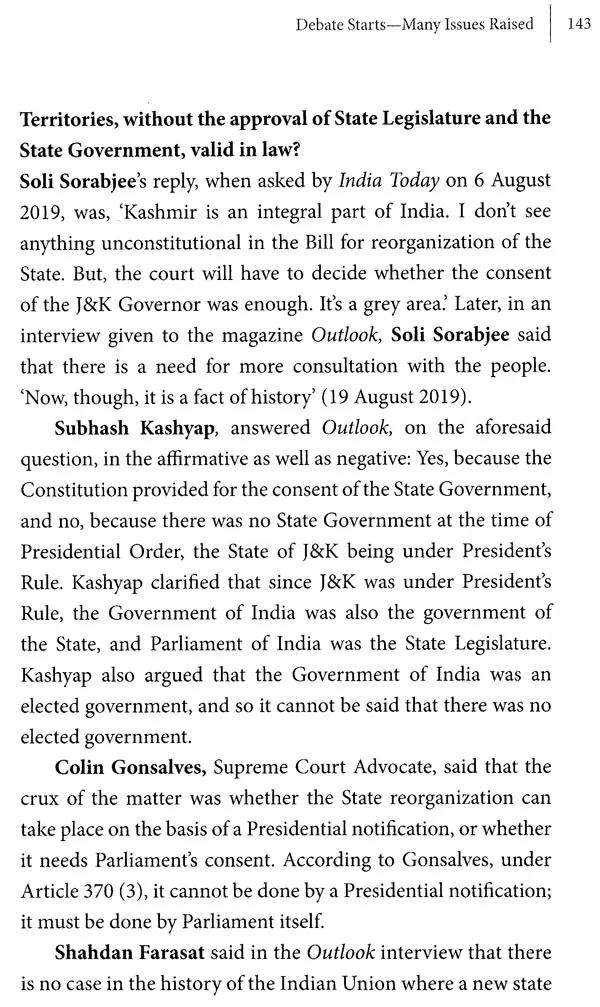
Article 370 Explained for the Common Man
Book Specification
| Item Code: | UAJ773 |
| Author: | Sumit Dutt Majumder |
| Publisher: | Niyogi Books |
| Language: | English |
| Edition: | 2020 |
| ISBN: | 9789389136432 |
| Pages: | 168 |
| Cover: | PAPERBACK |
| Other Details | 8.50 X 5.50 inch |
| Weight | 210 gm |
Book Description
In August 2019 the Government of India reconstituted the erstwhile state of Jammu and Kashmir into two union territories, Jammu & Kashmir and Ladakh, with effect from 31 October 2019. Previously, Article 370 of the Constitution of India had granted the state of Jammu & Kashmir a special status. This special status was abrogated and the state more closely integrated into the Indian union, with the passing of the Jammu and Kashmir Reorganisation Act, 2019, by both houses of the Indian Parliament. This book seeks to clarify the issues surrounding Article 370 and 35A of the Indian Constitution, thus making readers more informed about this important constitutional, political and legal matter. The beauty of the book lies in the fact that the author writes in a simple and lucid language, avoiding journalese, jargon and legalese, thereby making the issues accessible to the common man.
Sumit Dutt Majumder, former Chairman, Central Board of Excise and Customs, joined the Indian Revenue Service in 1974, after his Masters in Physics from IIT, Kharagpur. In the course of his career, he had dealt with various legal and constitutional issues and thus he is conversant with the nuances of the Constitution. On the GST Constitution Amendment Bill, he presented his views to the Select Committee of the Rajya Sabha in 2015. He is the author of Customs Valuation Law and Practice and four books on GST, the latest one being GST Explained for the Common Man.
With the Government's decision to do away with the special status of Kashmir provided by Article 370 of the Constitution of India, suddenly Article 370 became a household name, and everybody started talking about it—some well informed and others largely less informed or uniformed. From 5 August 2019, almost every day the news portals and the newspapers started putting up news reports and articles attempting to explain the issue, making some readers more enlightened while leaving a vast majority of readers bewildered. The moot point is that in order to understand the rationale behind putting Article 370 and Article 35A in the Constitution, as also the recent decisions of withdrawal of special status of Kashmir, one must have proper appreciation of not only Article 370 and Article 35A, but also the steps leading to their introduction and withdrawal. One must also know the basics of political and military history of Kashmir from the British Raj period and the events that unfolded from 1947 in the Kashmir Valley and the frontier areas of Gilgit, Baltistan, Kargil, Aksai Chin, etc. Against this backdrop, Nirmal Kanti Bhattacharjee, former Director, National Book Trust and currently Editorial Director, Niyogi Books, asked me during the middle of August 2019, if I could write a short monograph on Article 370, explaining the issues, the related events and views of the experts, for easy understanding by the common man. He referred to my previous book GST Explained for the Common Man published by Niyogi Books, and told me that the language, style and form for the proposed book could be as simple and readable as in my aforesaid book on GST. It was quite a daunting task. First, the subject was outside my domain expertise and it was fairly complicated too. Of course, I have been following the news reports and articles, rather extensively on the developments in Kashmir, relating to the withdrawal of 'special status' of Kashmir. This was out of 'extra-curricular' interest on Kashmir that had developed in me after reading a book written by friend and batchmate, Ambassador Rajiv Dogra, Where Borders Bleed. I may also mention, during my days in the Central Board of Excise and Customs, first as Member and thereafter as Chairman, I had the benefit of extensive exposition of the nuances of the Indian Constitution from Mr Pranab Mukherjee, then Finance Minister, while discussing issues related to taxation, particularly the GST Constitution Amendment Bill.
**Contents and Sample Pages**











